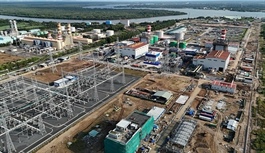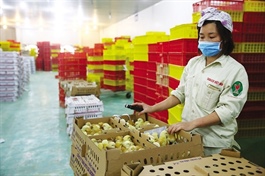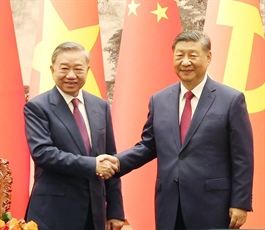Keeping inflation in check a priority for 2025
Keeping inflation in check a priority for 2025
Inflation remains a major hurdle to Việt Nam’s macroeconomic stability and sustainable development in 2025. Accurate forecasting and a thorough understanding of its driving factors are essential for devising effective policies, said economists and policymakers.

Economists have identified a range of factors that may exert inflationary pressure in 2025, including geopolitical risks, global trade disruptions and domestic challenges such as exchange rate fluctuations, rising import costs and natural disasters. The gradual shift to market-driven pricing for state-regulated services like electricity, education and healthcare, where full cost recovery is implemented, will also contribute to rising consumer prices.
Economist Ngô Trí Long said that while falling oil prices might reduce imported inflation, unpredictable fluctuations or geopolitical shocks could still trigger sudden changes in the Consumer Price Index (CPI).
Dr Hoàng Trung Đức from the Academy of Finance emphasised that domestic factors, including rising commodity prices, monetary policy adjustments, public spending and increased labour costs, will play significant roles.
External influences such as global energy prices, supply chain challenges and policy shifts in major economies are also expected to create additional inflationary pressures. These dynamics demand flexible and proactive policymaking to mitigate risks and maintain stability.
Two scenarios
Economists outlined two potential inflation scenarios for Việt Nam in 2025.
In the baseline scenario, inflation remains under control, staying below 4 per cent in line with the government’s target. This scenario assumes stable macroeconomic conditions, no significant external shocks and effective policy implementation.
“In this scenario, Việt Nam is able to maintain economic stability without major disruptions. It also highlights the importance of coordinated monetary, fiscal and price management policies to create a favourable business environment and improve living standards,” Đức said.
In the risk scenario, inflation exceeds the 4 per cent threshold, adversely impacting the economy and society. This outcome could arise from external shocks, such as surging energy prices or supply chain disruptions.
“If inflation surpasses the target, the cost of living will rise disproportionately, particularly affecting low-income groups. Stagnant wages amid soaring prices will reduce purchasing power, deepen social inequality and erode confidence in Việt Nam’s macroeconomic environment, ultimately slowing long-term growth,” Đức warned.
Economists have also proposed a series of measures including sustaining economic stability through proactive and flexible monetary policies, coordinated with well-targeted fiscal policies; prioritising high-quality credit for production, business and key sectors; and strengthening oversight of essential goods such as fuel, electricity, food and medicine to prevent sudden price spikes and limit non-essential imports to reduce supply-demand imbalances and imported inflation.
Experts stressed the importance of strengthening domestic supply chains and boosting local production to lower import dependency, noting that keeping inflation in check is vital for safeguarding livelihoods and fostering investment, growth and international economic integration.
Market trends
A group of researchers at the Institute of Economics and Finance (Academy of Finance) predicted that the goods market will experience fluctuations in the near term due to factors like seasonal demand. The CPI is expected to rise in the first quarter this year due to increased year-end consumer spending, food production and stockpiling for Tết. Seasonal factors such as winter in the north and holiday demand for goods like clothing and footwear will also drive price increases.
In addition, policy adjustments to the pricing of services such as healthcare, education and electricity, along with rising base salaries, will exert upward pressure on domestic prices. Meanwhile, weather-related disruptions, including storms and floods, could impact supply chains, leading to higher prices for food and other essentials.
Despite these pressures, limited household incomes and effective market regulation measures have kept price hikes in check. Experts project that the average CPI increase in 2025 will remain between 4 and 4.5 per cent, aligning with the National Assembly’s socio-economic development goals.
“Achieving this target will require coordinated efforts in monetary, fiscal and price management policies, along with measures to stabilise supply chains and support domestic production,” the research team concluded.























